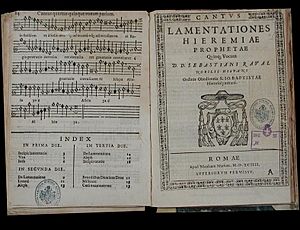Sebastián Raval facts for kids
Sebastián Raval (around 1550–1604) was a Spanish composer who wrote music for voices and instruments. He was born in Cartagena. Sebastián Raval was also a soldier in the Army of Flanders, fighting in places like Flanders and Sicily. After he was hurt during the siege of Maastricht, he joined a special group called the order of St. John of Jerusalem.
Later, he moved to Italy. There, he worked as a musician for important people. He played music for Francesco Maria II della Rovere in Urbino, and for the viceroy of Sicily, Bernardino de Cárdenas. He also worked for cardinals Peretti and Colonna in Rome.
In Rome, Sebastián Raval famously said he was the "best musician in the world." Because of this, other musicians challenged him to musical contests. First, Giovanni Maria Nanino challenged him, and then Francesco Soriano did. Raval lost both of these contests.
On April 28, 1595, he became the last Spanish maestro di cappella (music director) for the Spanish viceroys in Palermo. He took over from Luis Ruiz.
While in Sicily, he challenged another musician named Achille Falcone to a contest. At first, the judges said Falcone won. But after some appeals, Raval was declared the winner. Achille Falcone died in 1600. After his death, Achille's father, Antonio Falcone, published a book about this musical duel. The book included the pieces that Raval and Falcone had used in their competition, like canons, madrigals, motets, and ricercari. You can still find a modern version of these pieces today.
Sebastián Raval passed away in Palermo in 1604.
In 2004, 400 years after his death, his hometown of Cartagena honored him. They held a special concert where Pere Ros played the viola da gamba.
Contents
What Music Did Sebastián Raval Write?
Sebastián Raval wrote different kinds of music. He composed sacred polyphonic music, which is religious music with many voices. He also wrote madrigals, which are songs for several voices, usually about love. And he created instrumental ricercari, which are pieces for instruments that explore different musical ideas.
Most of Raval's music has not been fully studied yet. Only a few of his pieces have been published in modern times. Many more are waiting for music experts to research them.
Religious Music by Raval
- Motectorum liber primus: This book of motets (religious songs) was for 5 voices and published in Rome in 1593.
- Lamentationes Hieremiae Prophetae: This work, for 5 voices, was published in Rome in 1594.
- Motecta Selecta organo Accommodata: These motets were for 3 to 8 voices with organ accompaniment, published in Palermo in 1600.
Secular Music by Raval
- Il Primo Libro de Madrigali: His first book of madrigals for 5 voices, published in Venice in 1593.
- Il Pimo Libro di Canzonette: His first book of canzonette (light songs) for 4 voices, published in Venice in 1593.
- Madrigali: More madrigals for 3, 5, and 8 voices, published in Rome in 1595.
- Il Primo Libro di Ricercari: His first book of ricercari (instrumental pieces), published in Palermo in 1596.
- 2 Madrigals in "Infidi Lumi": These two madrigals were part of a collection published in Palermo in 1603, but they are now lost.
Where Can You Find His Music Today?
You can find some of Sebastián Raval's music in modern editions. These are books where his old music has been written out for today's musicians.
- "Achile Falcone-Madrigali, Mottetti e Ricercari": This book includes some of Raval's pieces. It was published by Leo S. Olschki Editore in Florence in 2000.
- "Sebastián Raval. 6 Canones (IL Primo Libro di Ricercari. Palermo 1596)": This edition of 6 canons was published by Sociedad Española de Musicología in Madrid in 1985.
- "Sebastián Raval. Il Primo Libro di Ricercari a Quatro Voci Cantabili, per liuti, cimbali et viole d'arco. Palermo, 1596.": This book of ricercari was edited by Andrés Cea Galán and published by Patrimonio Musical Español, Fundación Caja Madrid in Madrid in 2008.
- "Three ensemble ricercars in four parts from Il primo libro de canzonette, 1593": These three ricercars were edited by Milton Swenson and published by Dovehouse Editions in Ottawa in 1981.
Recordings of His Music
Some of Sebastián Raval's music has been recorded so you can listen to it.
- Da Pacem Domine: This is a motet for 8 voices in two choirs, performed by La Lyra Hispana.
See also
 In Spanish: Sebastián Raval para niños
In Spanish: Sebastián Raval para niños
 | Calvin Brent |
 | Walter T. Bailey |
 | Martha Cassell Thompson |
 | Alberta Jeannette Cassell |


